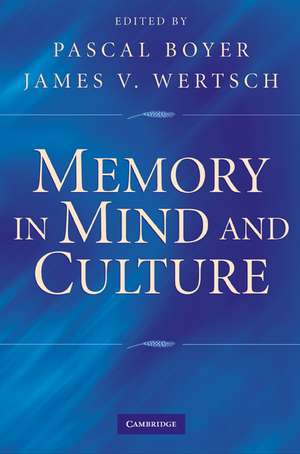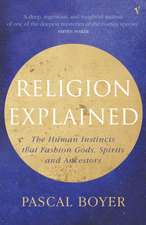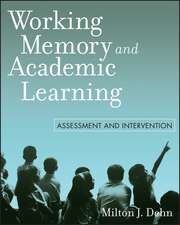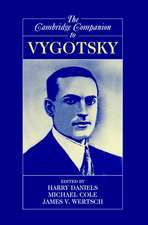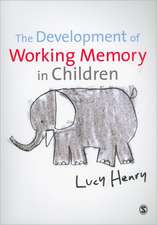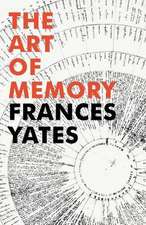Memory in Mind and Culture
Editat de Pascal Boyer, James V. Wertschen Limba Engleză Paperback – 28 mai 2009
| Toate formatele și edițiile | Preț | Express |
|---|---|---|
| Paperback (1) | 338.05 lei 6-8 săpt. | |
| Cambridge University Press – 28 mai 2009 | 338.05 lei 6-8 săpt. | |
| Hardback (1) | 699.45 lei 6-8 săpt. | |
| Cambridge University Press – 7 iun 2009 | 699.45 lei 6-8 săpt. |
Preț: 338.05 lei
Nou
Puncte Express: 507
Preț estimativ în valută:
64.69€ • 66.83$ • 53.84£
64.69€ • 66.83$ • 53.84£
Carte tipărită la comandă
Livrare economică 25 martie-08 aprilie
Preluare comenzi: 021 569.72.76
Specificații
ISBN-13: 9780521758925
ISBN-10: 0521758920
Pagini: 332
Ilustrații: 10 b/w illus. 8 tables
Dimensiuni: 152 x 228 x 18 mm
Greutate: 0.45 kg
Editura: Cambridge University Press
Colecția Cambridge University Press
Locul publicării:New York, United States
ISBN-10: 0521758920
Pagini: 332
Ilustrații: 10 b/w illus. 8 tables
Dimensiuni: 152 x 228 x 18 mm
Greutate: 0.45 kg
Editura: Cambridge University Press
Colecția Cambridge University Press
Locul publicării:New York, United States
Cuprins
Part I. In Mind, Culture and History: A Special Perspective: 1. What are memories for? Functions of recall in cognition and culture Pascal Boyer; Part II. How Do Memories Construct Our Past?: 2. Networks of autobiographical memories Helen L. Williams and Martin A. Conway; 3. Cultural life scripts and individual life stories Dorthe Berntsen and Annette Bohn; 4. Specificity of memory: implications for individual and collective remembering Daniel L. Schacter, Angela H. Gutchess, and Elizabeth A. Kensinger; Part III. How Do We Build Shared Collective Memories?: 5. Collective memory James V. Wertsch; 6. The role of repeated retrieval in shaping collective memory Henry L. Roediger III, Franklin M. Zaromb, and Andrew C. Butler; 7. Making history: social and psychological processes underlying collective memory James W. Pennebaker and Amy Gonzales; 8. How does collective memory create a sense of the collective? Alan Lambert, Laura Nesse, Chad Rogers, and Larry Jacoby; Part IV. How Does Memory Shape History?: 9. Historical memories Craig W. Blatz and Michael Ross; 10. The memory boom: why and why now? David W. Blight; 11. Historians and sites of memory Jay Winter; Part V. How Does Memory Shape Culture?: 12. Oral traditions as collective memories: implications for a general theory of individual and collective memory David C. Rubin; 13. Cognitive predispositions and cultural transmission Pascal Boyer.
Recenzii
“Memory isn't just for psychologists, or neuroscientists, anymore. Psychologists learned a lot about memory in the 100 years after Ebbinghaus. Then cognitive neuropsychology and cognitive neuroscience began to connect the psychology of memory "down" to its neural substrates. The remaining task is to connect the psychology of memory "up" to the other social sciences, viewing individual memory processes, and individual memories, in the context of social and cultural structures and processes lying outside the individual. Boyer and Wertsch have done just that. In this book, their authors summarize what we already know, and initiate a new line of research that will – it is to be hoped – remind psychologists that they are social as well as biological scientists, and foster the development of a cognitive perspective within the social sciences more generally.”
—John F. Kihlstrom, University of California, Berkeley
“Having studied memory all my life I thought that I knew something about it. This outstanding collection of essays by some of the most eminent pacesetters in the emerging field of "memory studies" forcefully reminded me that there is more to memory than what one can find in the minds and brains of individuals. We are witnessing the maturation of the young field of "memory studies," and this volume provides us with a ringside seat.”
—Endel Tulving, University of Toronto
“Boyer and Wertsch present a much needed edited volume combining the most recent results of memory studies in cognitive psychology with studies in history and anthropology. The basic argument, that we need to pay attention to how memories are formed before we can discuss what they mean, is compelling. The contributors to this volume cogently discuss the impact of repeated retrieval and feedback patterns, as well as encoding and priming processes, and link them to specific instances of individual and social remembering, drawing examples from autobiographies, small-scale oral societies, as well as nation-states. This book provides a solid foundation for informed, interdisciplinary discussions on memory.”
—Lucia Volk, San Francisco State University
"...Offering an important look at the extensive body of data on memory, this impressive compilation of research findings offers a much-needed synthesis of current and historical perspectives on memory processes... The merge of behavioral and neuro-imaging research offers an intriguing perspective on fundamental questions related to memory. Because each study approaches the question of culture and memory from a unique perspective, one finds new insights at every turn... More than a melange of research findings, this is one of the most thought-provoking discussions of memory this reviewer has encountered in a long time... Essential..."
– T. A. Brown, Savannah College Art and Design, Choice
"There are many books on memory, most of them on the experimental and clinical aspects or episodic, instrumental and semantic memory, but this edited volume reflects the surge of interest in autobiographical memory (AM) and in the collective memories of cultures.... it makes somewhat interesting general reading.... It will be enjoyed by skeptics and anti-establishment activists."
– Andrew Kertesz, London, Ontario, Canada, The Canadian Journal of Neurological Sciences
"....this book provides excellent reviews of up-to-date memory research in psychology-from brain structures to blogs-and also innovatively connects this research to larger questions about human culture.... the coverage of eminent cognitive psychologists is admirable.... the book advances the field in important ways, pointing the way to new research and theories. While it might be especially useful for graduate students in cognitive, cultural, or interdisciplinary psychology, this volume would grace the bookshelves of anyone interested in how human minds and cultures interact with one another."
--Emma E. Buchtel, Hong Kong Institute of Education, Canadian Psychology/Psychologie Canadienne
"....This volume contains a fascinating collection of essays on individual and collective memory, mostly from the field of psychology, and raises the prospect of fruitful conversations on the processes of memory formation between cognitive psychologists and neurologists on the one hand and anthropologists and historians on the other.... the structure of the book itself creates the framework for a coherent narrative and a cumulative argument.... well written, and accessible, and the volume develops its arguments in part because the essays are remarkably well integrated and build on one another.... The volume is also fortunate to have included contributions from two of the finest historians of memory, David W. Blight and Jay S. Winter, authors of several memory studies of the American Civil War and the First World War, respectively.... the essays here are rich with potential insights for historians...."
– William Van Arragon, The King's University College, Canadian Journal of History
—John F. Kihlstrom, University of California, Berkeley
“Having studied memory all my life I thought that I knew something about it. This outstanding collection of essays by some of the most eminent pacesetters in the emerging field of "memory studies" forcefully reminded me that there is more to memory than what one can find in the minds and brains of individuals. We are witnessing the maturation of the young field of "memory studies," and this volume provides us with a ringside seat.”
—Endel Tulving, University of Toronto
“Boyer and Wertsch present a much needed edited volume combining the most recent results of memory studies in cognitive psychology with studies in history and anthropology. The basic argument, that we need to pay attention to how memories are formed before we can discuss what they mean, is compelling. The contributors to this volume cogently discuss the impact of repeated retrieval and feedback patterns, as well as encoding and priming processes, and link them to specific instances of individual and social remembering, drawing examples from autobiographies, small-scale oral societies, as well as nation-states. This book provides a solid foundation for informed, interdisciplinary discussions on memory.”
—Lucia Volk, San Francisco State University
"...Offering an important look at the extensive body of data on memory, this impressive compilation of research findings offers a much-needed synthesis of current and historical perspectives on memory processes... The merge of behavioral and neuro-imaging research offers an intriguing perspective on fundamental questions related to memory. Because each study approaches the question of culture and memory from a unique perspective, one finds new insights at every turn... More than a melange of research findings, this is one of the most thought-provoking discussions of memory this reviewer has encountered in a long time... Essential..."
– T. A. Brown, Savannah College Art and Design, Choice
"There are many books on memory, most of them on the experimental and clinical aspects or episodic, instrumental and semantic memory, but this edited volume reflects the surge of interest in autobiographical memory (AM) and in the collective memories of cultures.... it makes somewhat interesting general reading.... It will be enjoyed by skeptics and anti-establishment activists."
– Andrew Kertesz, London, Ontario, Canada, The Canadian Journal of Neurological Sciences
"....this book provides excellent reviews of up-to-date memory research in psychology-from brain structures to blogs-and also innovatively connects this research to larger questions about human culture.... the coverage of eminent cognitive psychologists is admirable.... the book advances the field in important ways, pointing the way to new research and theories. While it might be especially useful for graduate students in cognitive, cultural, or interdisciplinary psychology, this volume would grace the bookshelves of anyone interested in how human minds and cultures interact with one another."
--Emma E. Buchtel, Hong Kong Institute of Education, Canadian Psychology/Psychologie Canadienne
"....This volume contains a fascinating collection of essays on individual and collective memory, mostly from the field of psychology, and raises the prospect of fruitful conversations on the processes of memory formation between cognitive psychologists and neurologists on the one hand and anthropologists and historians on the other.... the structure of the book itself creates the framework for a coherent narrative and a cumulative argument.... well written, and accessible, and the volume develops its arguments in part because the essays are remarkably well integrated and build on one another.... The volume is also fortunate to have included contributions from two of the finest historians of memory, David W. Blight and Jay S. Winter, authors of several memory studies of the American Civil War and the First World War, respectively.... the essays here are rich with potential insights for historians...."
– William Van Arragon, The King's University College, Canadian Journal of History
Descriere
Provides answers about human memory and its role in making us who we are and societies who they are.
